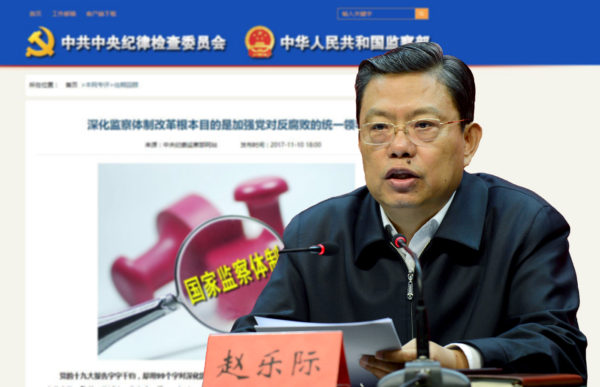◎ The CCDI choice of the phrase “nine dragons ruling the waters” appears to be an oblique reference to the changes Jiang Zemin made to the Politburo Standing Committee to control Hu Jintao after he took office in 2002.
The Central Commission for Discipline Inspection (CCDI) promoted the new state-run National Supervisory Commission in an article on its website published on Nov. 10.
The article also mentioned that the anti-corruption drive must be carried out “with a clenched fist” and not with “nine dragons ruling the waters” (jiu long zhi shui)—in other words, a call for singular, focused work that produces results and not diffused, ungovernable effort that leads nowhere.
Why it matters: The CCDI choice of the phrase “nine dragons ruling the waters” appears to be an oblique reference to the changes Jiang Zemin made to the Politburo Standing Committee to control Hu Jintao after he took office in 2002.
The backdrop: During the 16th Party Congress in 2002, Jiang increased the number of Politburo Standing Committee members from seven to nine and stacked the Committee with his allies like Central Political and Legal Affairs secretary Luo Gan and propaganda apparatus chief Li Changchun.
Many observers noted that the collective leadership structure during Hu’s tenure effectively diluted his power, and they frequently used the phrase “nine dragons ruling the waters” to describe Hu’s plight.
The Chinese Communist Party (CCP) first adopted the collective leadership model after the Cultural Revolution (1967-1977) to safeguard against the emergence of another all-power dictator like Mao Zedong.
Our take: Xi Jinping might be the CCP’s “core” leader and recently added his “Xi Jinping Thought” into the Party constitution, but the existence of the Politburo Standing Committee indicates that the CCP hasn’t moved away from collective leadership. So the CCDI’s reference to “nine dragons ruling the waters” is not a critique of the collective leadership system, but instead points to the 9-member Politburo Standing Committee that Jiang forced upon Hu.












